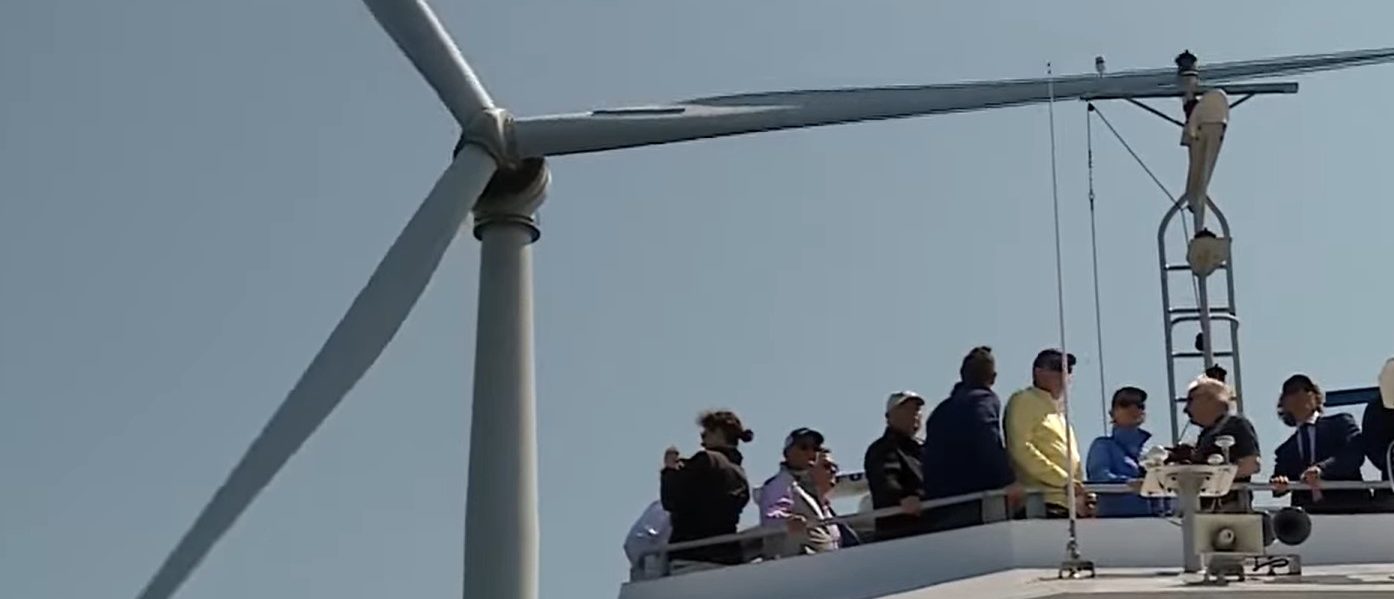Commentary: Big Tent Ideas
DAVID BLACKMON: Biden Energy Regulators Think They’re The Smartest People In The Room

Energy Secretary Jennifer Granhold visits on offshore wind farm in Rhode Island. (Screen Capture/WPRI)
As part of its costly efforts to try to force a flagging energy transition into being via heavy regulation and debt-funded subsidies, the Biden administration has continued to elevate its war on natural gas on several fronts.
This 2024 offensive started in January, when the White House invoked a poorly reasoned “pause” in permit approvals for new LNG export facilities in a clear effort to impede the growth of the domestic industry and deny gas producers access to international markets. Justifications offered for the move by the White House, Energy Secretary Jennifer Granholm and other administration spokespersons are absurd on their face, failing to disguise the clear political motivations at play.
Speaking at the CERAWeek conference in Houston in March, Granholm said, “I predict that as we sit here next year… this will be well in the rearview mirror.” Granholm added the pause is “like other studies we’ve done in the past.”
While that last bit is true as far as it goes — conducting environmental impact studies are a regular part of the federal government’s business — she would be at great pains to identify any precedent in which the government halted progress on an entire sector of multi-billion-dollar projects for a year to conduct one.
The next move in Biden’s withering assault on natural gas came on April 23, when the Bureau of Land Management (BLM) published its new rule related to fluid minerals leasing on federal lands under its management. BLM lands include vast swaths of oil and gas producing states like New Mexico, Colorado, Wyoming, Montana and Utah.
The new rule heavily restricts producers’ ability to lease federal lands and dramatically raises the costs of doing business with big increases in royalty rates, permit fees and bonding requirements.
Two days later, Biden’s Environmental Protection Agency finalized its rule on power plant emissions. Within days, dozens of state attorneys general had filed suits in federal court challenging the new regulation, employing the same legal arguments that resulted in the courts striking down a similar regulation published during the Obama administration.
The rule is clearly designed to force the shutting down of all remaining coal power plants in the United States within just a few years, despite the fact that they provided 16% of total domestic power generation in 2023, more than wind and solar combined. The rule’s onerous provisions also constitute a clear effort to prevent the building of any new natural gas power plants by rendering them too costly to finance, despite the fact that natural gas plants generated 43% of the country’s electricity last year, as detailed by Biden’s own Energy Information Administration.
The administration’s most recent move came this week, when the Federal Energy Regulatory Commission did an end-run around congressional legislative authority, publishing FERC Order 1920, a 1,363-page ruling governing the permitting of new power transmission lines. The order would streamline permitting processes — in part by reducing the authority of states and local governments–for new transmission projects.
But the catch is that it will only provide such streamlining for projects moving electricity generated by renewables. As such, it is a clear effort to both socialize the costs of regional transmission projects across all 50 states, and to crowd out other forms of generation by using the permitting process to discriminate against them and by usurping authorities that have been reserved to state and local governments for many decades.
So, the Biden administration, in the waning days of its first — and possibly only — term in office, is attempting to force all but its favored sources of power generation out of the picture at a time when power demands are skyrocketing. The question then becomes, can renewables alone fill that need?
Current battery technology to back up these intermittent and unpredictable forms of generation does not support a happy outcome to that question. That is simply undeniable.
This kind of central planning, using authoritarian command-and-control regulations, has not had a positive track record for success in the U.S. in years past. But much like executives at Enron 25 years ago, the Biden people obviously believe they are the smartest guys in any room, so we are all commanded to believe that this time it will all work out.
The trouble is, we all remember what happened to Enron.
David Blackmon is an energy writer and consultant based in Texas. He spent 40 years in the oil and gas business, where he specialized in public policy and communications.
The views and opinions expressed in this commentary are those of the author and do not reflect the official position of the Daily Caller News Foundation.
All content created by the Daily Caller News Foundation, an independent and nonpartisan newswire service, is available without charge to any legitimate news publisher that can provide a large audience. All republished articles must include our logo, our reporter’s byline and their DCNF affiliation. For any questions about our guidelines or partnering with us, please contact [email protected].

